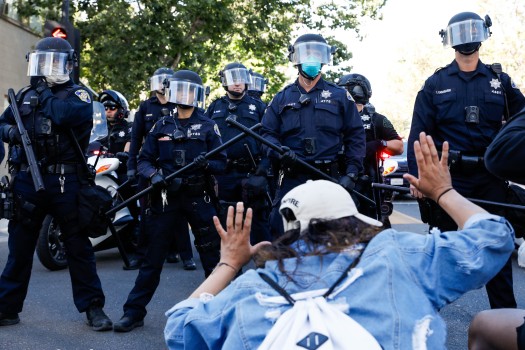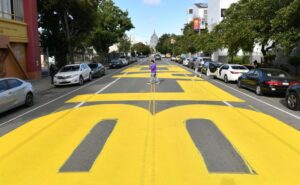A wide-ranging federal lawsuit against San Jose over severe protester injuries and violent police actions at last year’s George Floyd demonstrations is moving ahead after a judge largely rejected the city’s attempt to get the case dismissed early.
An order last week by Judge Phyllis Hamilton means that the suing attorneys — the Lawyers’ Committee for Civil Rights of San Francisco Bay Area and experienced police-misconduct litigators Rachel Lederman, Jim Chanin, and Michael Flynn — are a step closer in securing class-action status for the suit, which would significantly expand the plaintiff group beyond the current 14 named clients.
The lawsuit, filed in March, alleges civil-rights violations by San Jose police and city leadership covering excessive force, wrongful arrest, and First Amendment infringements stemming from both enforcement tactics and the issuing of a city-wide curfew after the first few days of violent clashes at the end of May 2020. Attorneys are also seeking to compel wholesale changes in police training and policies that authorized the violence that drew national infamy to the city.
While Hamilton’s order was a procedural assessment of the legal standing of the lawsuit’s 16 claims, plaintiff attorneys consider it an encouraging sign that their critiques of how the city and police cracked down on demonstrators protesting the police killing of George Floyd will eventually be affirmed by the court.
“This tells both San Jose and other jurisdictions that they have to be very careful with what tactics they use to engage with their citizens, that they have to make people feel comfortable and safe to listen to instructions to police, and move freely in their city,” said Tifanei Ressl-Moyer, an attorney fellow for the lawyers’ committee. “We’re really hoping that this order demonstrates to city officials and police that criticism of how they operate is also constitutionally protected.”
The City Attorney’s Office declined to weigh in on the judge’s order, citing a practice of not commenting on pending litigation.
Scores of people were injured during a week of demonstrations that started May 29, 2020 in downtown San Jose, most of them by police’s prolific use of rubber bullets and other projectiles and chemical weapons. In previous comments, the police union asserted short staffing factored into the protest response and that 100 officers were injured over the course of the demonstrations.
“We saw the city trying to push the narrative that folks protesting were violent and disruptive, and this (order) recognizes the city has a lot more responsibility in that situation. If violent people are there, you have to discern if there is an actual threat, and be very specific how you approach that single incident,” Ressl-Moyer said. “You cannot just have an indiscriminate response to everyone present.”
The filing addressed by Hamilton last week is the largest lawsuit filed from the fallout from the protests. Among the plaintiffs are Michael Acosta, a resident who asserts he lost an eye to a police projectile; Joseph Cañas, who was also hit in the eye by a police munition as he played guitar at the protests; a pre-elected Assemblymember Alex Lee; and activist Shaunn Cartwright, who claims that while serving as a legal observer, was shoved repeatedly by an officer even after she alerted them to her physical disabilities.
Eleven of the city’s dismissal motions were denied by the judge outright. That means First Amendment violation claims, alleging that police targeted demonstrators based on their viewpoints and that a city curfew infringed their free expression, can move ahead to the evidentiary phase. The same goes for federal claims of excessive force, wrongful arrest, failure of officers to intervene with other officers using unlawful force, failure to accommodate a disability, and a series of parallel claims of state-law violations.
Hamilton did agree with the city in dismissing claims alleging race-based targeting of protesters and that officers specifically violated protesters’ freedom of movement. She partially dismissed a claim over the curfew and limited potential liability to Mayor Sam Liccardo, former city manager Dave Sykes, former police chief Eddie Garcia and the City of San Jose.
The judge did not decide on issues addressing qualified immunity for officers — legal protections for officers against monetary damages — and questions over officers’ lack of crowd-control training. Hamilton wrote that the next information-gathering phase — discovery — will have to be done first. She will then evaluate those issues in later summary judgment proceedings, where she will decide again if the case can advance toward trial.


















